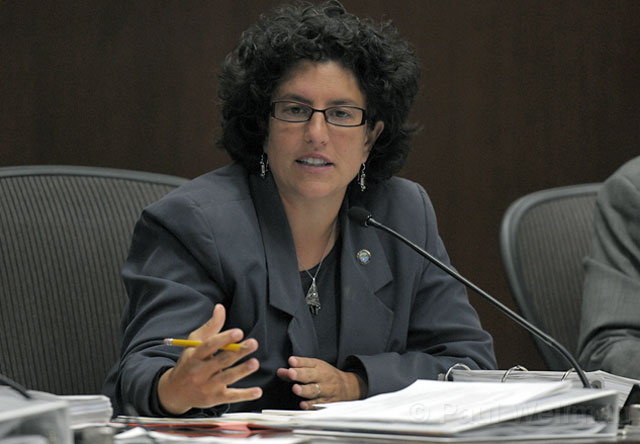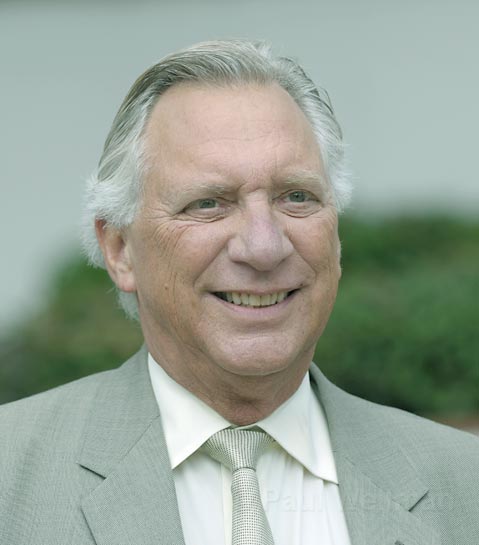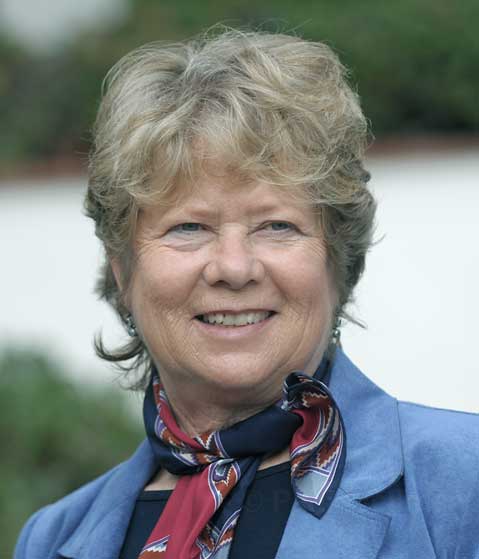Plastic Bag Ordinance Tweaked, Not Overhauled
“Better than Nothing,” Says Mayor

If cities like Long Beach and Calabasas have banned single use plastic bags, many South Coast environmental activists are mystified — and exasperated — they can’t persuade the Santa Barbara City Council to do the same. But after a lengthy, if nutrient rich, war of words this Tuesday, the Santa Barbara council — controlled by a more conservative majority — shied away from the more dramatic action demanded by the Community Environmental Council, Channelkeeper, and a new, more theatrical outfit of ad hoc advocates called Save the Mermaids.
Instead, the council voted for a more mild-mannered proposal that would require major supermarkets and produce dispensers to offer their customers reusable tote bags at affordable prices, post signs inside and outside their premises stating such bags are available, and training their employees in the art of encouraging customers to switch to reusable bags. For the past three years, City Hall has merely encouraged such voluntary efforts, while also spending more than $35,000 on a “Where’s Your Bag?” PR campaign designed to encourage use of tote bags.
Councilmember Dale Francisco — clear leader of the conservative majority — demonstrated yet again that he’s the most procedurally agile operator on the council. Francisco — up for reelection this fall — expressed enthusiastic support for taking the issues to city voters in the form of a ballot initiative that would impose a tax on both plastic and paper bags. While that won by a vote of 5 to 2 — with councilmembers Frank Hotchkiss and Randy Rowse opposing — Mayor Helene Schneider (who supported the plastic bag ban) all but called the action an empty gesture. By asking City Attorney Steve Wiley a series of technical and legal questions, Schneider sought to show that the soonest such a ballot measure could actually make it to city voters was 2013. To defer action to such a date, she said was “to do nothing.” Still, she concluded, “It’s better than nothing.”
In recent years, plastic bags have emerged as the new environmental battleground du jour. Symbolically, they represent everything that’s wrong with what environmentalists decry as the mindlessly destructive “use-and-toss culture” that’s killing off the planet in general and sea life in particular. Immune to the normal process of biodegradation, plastic bags don’t just persist in nature, but they — and other forms of cast-off plastic — accumulate throughout the oceans as vast pseudo land masses that horrify the moral sensibilities environmental activists. Because plastic bags are often mistaken for jellyfish, they are swallowed whole by whales, sea turtles, and some marine birds.

In certain instances, the bags can be pooped out. But in others, the bags serve to choke and clog the intestines of the animals that ingested them, resulting in starvation and death. Unlike climate change — which seems inevitable, inexorable, and impervious to individual action — plastic bags pose a problem that can actually be solved with a minimum of personal sacrifice and inconvenience. Hence its popularity as an issue. But for conservatives — like Frank Hotchkiss and Michael Self on the City Council — plastics bags are yet another pseudo problem to trumped up and exaggerated by environmental hysterics, ever in search of a regulatory cure. To the extent there actually is a problem, they insist, education, cooperation — and new technological quick fixes — are the solution, not legislation and regulation. To an unusual degree, the debate has been colorful, contentious, educational, and illuminating. But as usual, few minds have been changed along the way.
To the extent any facts are really known about plastic bags in Santa Barbara, an estimated 29 million a year are given out within city limits. Of those, about 5 percent are recycled. Most wind up in landfills. And to some indeterminate degree, others are blown hither, thither, and yon, littering creeks, beaches, and waterways. City Parks employees have reported plastic bags are not an issue. But Creeks Division workers reported that plastic bags were found at all 268 littered sites they cleaned up last year. Forty-two plastic bags were found along a quarter-mile stretch of Sycamore Creek on one day. And the Coastal Commission reported that during countywide beach cleanup efforts, 700 plastic bags have been picked up in each of the past two years by volunteer crews. Where Santa Barbara’s bags actually go once on the loose — and how many aquatic stomachs they clog — no one really knows.
When City Hall gave birth to the “Where’s Your Bag?” campaign, 12 major produce outlets signed up. Of those, only three have shown sustained interest. Of those, Tri-County Produce has been the real star. Owner John Dixon gives customers who use reusable bags paper tickets worth five cents each which they can “donate” to one of numerous charities. To date, Dixon has redeemed $5,000 worth of these tickets, the equivalent, he said, to 100,000 reusable bag trips. Likewise, Lazy Acres has gotten high marks for its efforts. And Trader Joe’s employees — trained to engage customers in conversation — always make a point to thank shoppers who bring their own bags. Of the big chains, Albertsons has clearly shown the most initiative. This spring, its Carpinteria store stopped offering paper or plastic bags to its shoppers altogether and experienced no loss of business or customer loyalty as a result. And most recently, Gold Coast Recycling — which handles the recyclable market for the South Coast — has just agreed to take plastic bags. For the first time, South Coast residents can now put plastic bags in their blue curbside recycle bins.
But for Kathi King of the Community Environmental Council (CEC), Kyra Redmond of Channelkeeper, and Eric Cardenas of LoaTree, these successes are far too little and far too late. Increased recycling, argued King, is hardly the solution. It means shipping the bags to China, where they are typically incinerated in worksites notable for poor working conditions. Voluntary efforts, added Redmond, have been a bust. And given that Santa Barbara gave birth to the environmental movement, insisted Cardenas, the City Council should provide leadership by passing a ban. Upstaging everyone was Emma Cohen of Save the Mermaids, who accurately anticipated that Councilmember Frank Hotchkiss would argue that plastic bags pose no health threat to sea life — as he had the last time the matter came before the council. Cohen and her fellow mermaids brought a serving tray stacked with plastic sandwiches, which she offered with sweet sarcasm to councilmembers who thought plastic bags could be easily digested. She warned them the food might be a little “chewey,” and as an hors d’oeuvre, she offered a few bags. If 25 percent of the countries on the planet banned plastic bags, she argued, so could Santa Barbara.
Not this week. Playing the role of skeptical contrarian to the hilt, Hotchkiss expressed confidence that plastic bags posed only an inconvenience for sea creatures that ingested them, not a deadly peril. The bags could be pooped out, he argued; life would go on. “I don’t think this is a scourge on the planet,” he declared. “I don’t think we will save it by banning plastic bags.” He took exception to Kathi King’s statement that plastic bags constitute a failure of consumer culture. “I think it’s a symptom of our consumer culture that is working,” he added. “We all use them for their convenience.” To the extent plastic bags do pose a problem, he said, it’s an issue best solved by new microbes “for which plastic is turkey and steak.” As for reusable tote bags, Hotchkiss expressed concerns about how sanitary they are. At one point, he suggested inserting language into the proposed new ordinance instructing people on the need to wash reusable bags.

Hotchkiss and Councilmember Michael Self quibbled, fussed, and minimized the numbers provided by City Hall’s solid waste planners. Self said she’d been recycling long before it became fashionable because it was the right thing to do, not because of what she called environmental guilt-tripping. She took exception to the use of the political term “progressive,” adding, “I have an alternative word I’d like to insert — dictatorial.” Self added, “We are being more enlightened not because of government dictates and mandates but because we’re better educated.” Self then objected, “I don’t want government telling me what kind of light bulb I can have.” She suggested environmentalists might soon be clamoring for restrictions on chip bags or the plastic film used to cover meat, as well. “It’s a slippery slope,” she warned.
Councilmember Randy Rowse expressed a conviction that plastics in the ocean posed a real problem, citing his personal experience as a boater and surfer. But he expressed doubt that passing an ordinance was the best way to solve it. He called new ordinances “the graveyard of good intentions,” arguing they gave people the false impression that a problem has been addressed. Instead, he expressed hope that councilmembers could meet with executives from the major supermarkets and ask them get more involved in the solution. To motivate them, he said, City Hall needs the viable threat of a more “draconian” regulation.
Councilmember Francisco argued against passing a ban, predicting it would not survive legal challenge. He, too, favored an extension of the voluntary program. But he said the issue was sufficiently important that the council should put it to city voters. But rather than put a proposed ban to city voters, he argued City Hall should ask if they wanted to impose a new tax on themselves for both paper and plastic bags.
Councilmembers Bendy White and Grant House strongly favored an outright ban on plastic bags and the imposition of a fee on paper bags. But both clearly understood they didn’t have the votes. Mayor Helene Schneider took exception the anti-regulation arguments advanced by the council’s conservative majority. Sometimes, she argued, government has to step in and pass clear rules and regulations, as with the Clean Water Act. The voluntary approach, she said, does not work when dealing with known health risks like asbestos. Speaking in mock outrage, Schneider said, “We’re forcing builders not to put asbestos in buildings anymore. Oh my god!” She was equally dismissive of Rowse’s suggestion that City Hall could now enlist supermarket executives into a meaningful effort to promote reusable bags. She predicted the exchange would go along the lines of, ”I know we asked you already, but we really mean it this time.”
When it came to Francisco’s ballot suggestion, Schneider was more oblique, but no less skeptical. A ballot measure, she said, would be meaningful only if it occurred this year. Given the legal and environmental scrutiny that any ballot measure must receive, there’s no way the measure could qualify for this November’s city elections. After that, the next regularly scheduled city election takes place 2013. “To say 2013 is to not do anything,” she lamented. And she suggested Francisco favored asking voters to tax themselves — as opposed to imposing a ban — because tax increases tend to be harder to pass. Councilmember Rowse, who had argued that supermarket executives needed a viable threat to bring them to the bargaining table, wound up voting against Francisco’s measure without giving any explanation. Schneider, for all her misgivings, went along with it and the expansion of the “Where’s Your Bag?” program, explaining, “It’s better than nothing.”



